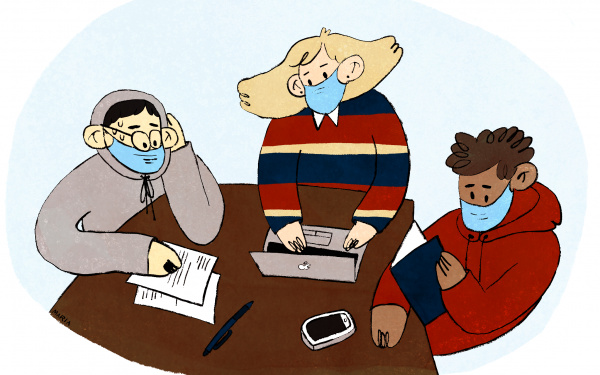Books With Spines. Literally.
Vanier Library Hosts First Human Library
Though the notion of renting a person might seem a bit unseemly, Katherine Hall, coordinator of the Human Library project, insisted the event is not at all like slavery.
“Some have said it’s prostitution too,” joked Hall. “It is neither prostitution nor slavery.”
In fact, the Human Library is quite the opposite. Its purpose is to break down stereotypes by having volunteers talk about their personal life experiences in a one-on-one setting for half
an hour.
“People have preconceived notions, assumptions, prejudices that they hold against other people,” said Hall. “The idea was that if you can sit down with someone and actually find out about their life experience, it’s kind of hard to hold on to those prejudices.”
Human books—of which there were 24 at Saturday’s event in the Vanier Library at Loyola—are people talking about topics like feminism, homophobia, religion, homeschooling, parenting and many others.
The free event saw a steady flow of people pass through the library’s ground floor. The project featured several work desks spread out in a common area, with a human book on one end and a ‘reader’ opposite.
And, like kids not quite ready to leave the playground, many wanted more time.
“There was too much to cover,” said Stuart Vas, who borrowed the ‘book’ “Feminist, Vegetarian, Atheist, Rape-Survivor.” He said he had a preconception of what the ‘author,’ Gabrielle Bouchard, would be talking about, but was taken back by her story.
“I’ve worked in the field of addiction and mental health, and I’ve heard quite a bit of stories, and that one is up there.”
Human book Stephanie Vriend, who titles her story “That Girl is ‘Different:’ Growing Up Queer in a Small Town,” sees the Human Library as more valuable than actual books.
“There’s so much more information that can be given to a person in a 30-minute conversation that would otherwise come from a 500-page textbook that is much drier,” she said.
The Multi-Faith Chaplaincy sponsored event, and it is Concordia’s first Human Library—the original concept originated in Denmark in 2000—but Hall hopes it won’t be the last. She said talks are still
open for doing the same thing next year.
“There’s so much more information that can be given to a person in a 30-minute conversation,”
–Stephanie Vriend, Human Book
This article originally appeared in Volume 32, Issue 04, published September 20, 2011.




2WEB_600_375_90_s_c1.jpg)

_600_375_90_s_c1.jpg)
_600_375_90_s_c1.jpg)